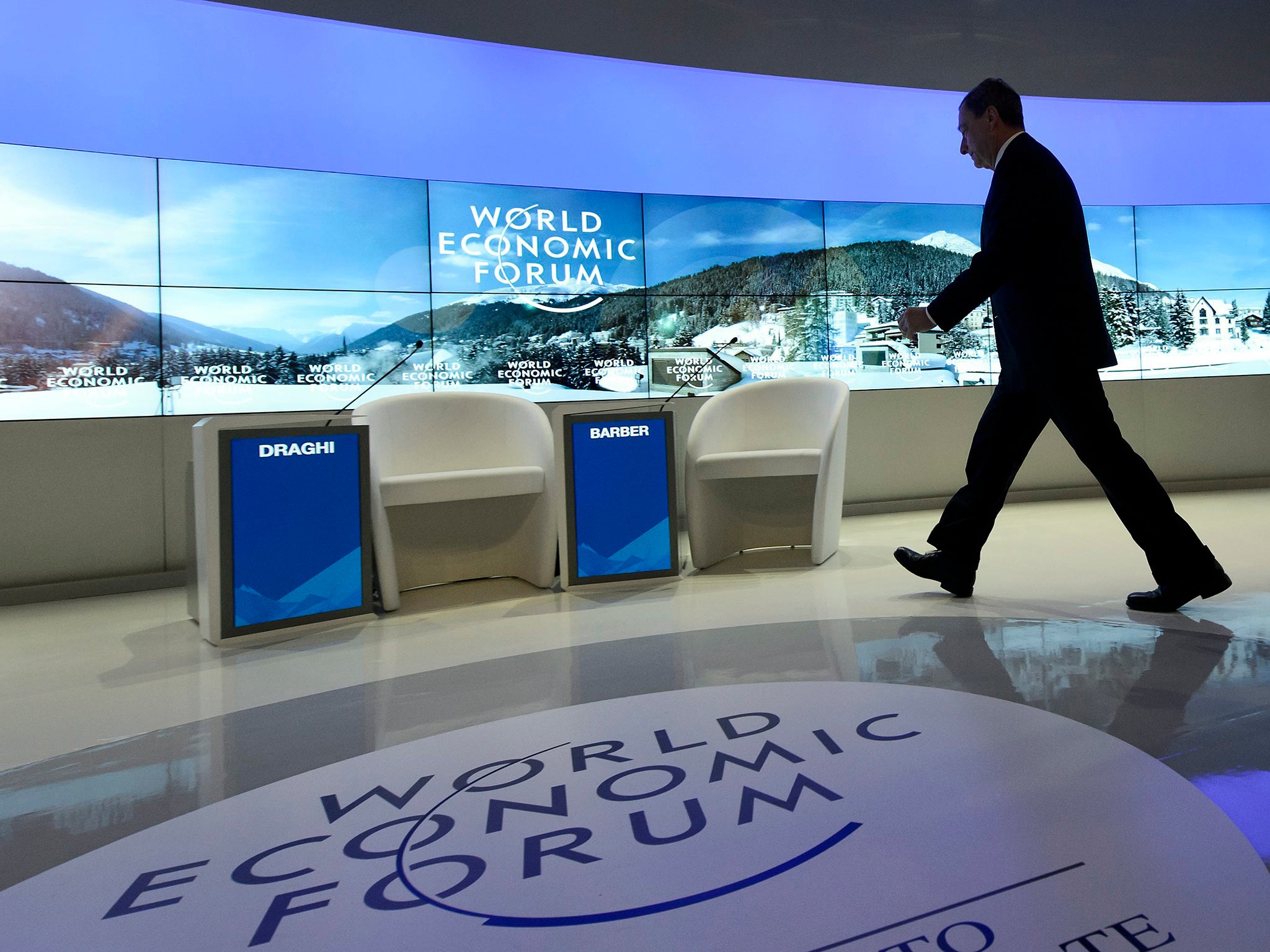Markets rally as Davos gives hope to investors on eurozone and oil
Draghi bullish on Europe’s deflation as Osborne sounds optimistic note for future

Global financial markets staged a relief rally at the end of a turbulent week yesterday on the back of hopes of further stimulus to come from the European Central Bank and a sense that fears about the oil price might prove overdone.
The FTSE 100, which dipped into bear market territory on Wednesday, closed 2 per cent higher at 5,900, chalking up its first weekly gain this year. Shares across Europe also rose, leaving the FTSEurofirst 300 with a 2.7 per cent gain on the week, while across the Atlantic the Dow was 150 points higher at 16,032 in afternoon trade. The price of some safe-haven assets such as gold receded, also reflecting a “risk on” sentiment among many traders, while the cold snap in the US and Europe helped a barrel of Brent crude bounce above the $30 mark.
The biggest boost to buying came, once again, from Mario Draghi, the president of the European Central Bank, who stressed that he has the necessary “instruments” to pull the eurozone out of the grip of deflation and that the governing council is now united in its willingness to use them.
Speaking at the World Economic Forum in Davos, Mr Draghi doubled down on the bullish message from his Frankfurt press conference on Thursday, telling delegates the ECB would be successful in bringing inflation in the single currency back to the target of just below 2 per cent.
“We have plenty of instruments and determination and willingness of the governing council to act,” he said, hinting at an extension of the central bank’s €1.1 trillion QE programme in March.
The Chancellor, George Osborne, also speaking in Davos, said the outlook was brighter than many traders believe. “I would look a bit beyond the markets and say what’s driving these things,” he said. “China is moving to a consumption-based economy. That’s a good thing. Energy is cheaper. That’s a good thing for most families and most business and most countries.”
The Chancellor also implicitly endorsed the more monetary activist approach of Mr Draghi. “You’ve got the European Central Bank acting like a central bank does in the United States or the United Kingdom,” he said. The ECB has been fiercely criticised by many economists for failing to do enough to support growth in the eurozone since 2011.
On Britain, Mr Osborne told an audience of business leaders in the Swiss resort that the UK economy had been a “chink of light cutting through the global gloom” in recent years, although public borrowing figures for December yesterday suggested the government is set to overshoot its deficit reduction target for 2015-16 by about £10bn. Mr Osborne also stressed that he had given $100bn of support to businesses since 2010 through tax cuts and promised “my door is always open to you”.
Some argued comments from Davos also helped the oil price. The chairman of Saudi Aramco, the Saudi state oil company, Khalid al-Falih, had told the WEF earlier in the week that $30-a-barrel oil was “irrational” and predicted a recovery in 2016.
Asked about the falls in stock markets since the start of the year, Mr Draghi appealed for calm. “There are market vibrations, gyrations, heightened sensitivity to risk, but it’s too early to say perceptions have changed,” he said.
He said the ECB saw the eurozone’s recovery advancing “modestly but consistently” and added that coping with the influx of refugees would support growth. “The government expenditure that will be needed could turn out to be the largest public expenditure project in many years,” Mr Draghi said.
A much more pessimistic view on Europe came from the billionaire financier George Soros. “The EU is falling apart,” he told an audience. “We have passed a tipping point where the influx reduces the capacity of the countries to assimilate or integrate the refugees. Everybody is out for himself.”
Subscribe to Independent Premium to bookmark this article
Want to bookmark your favourite articles and stories to read or reference later? Start your Independent Premium subscription today.

Join our commenting forum
Join thought-provoking conversations, follow other Independent readers and see their replies